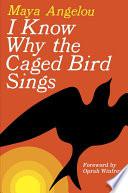Quotes from book
I Know Why the Caged Bird Sings

I Know Why the Caged Bird Sings is a 1969 autobiography describing the early years of American writer and poet Maya Angelou. The first in a seven-volume series, it is a coming-of-age story that illustrates how strength of character and a love of literature can help overcome racism and trauma. The book begins when three-year-old Maya and her older brother are sent to Stamps, Arkansas, to live with their grandmother and ends when Maya becomes a mother at the age of 16. In the course of Caged Bird, Maya transforms from a victim of racism with an inferiority complex into a self-possessed, dignified young woman capable of responding to prejudice.

“Children's talent to endure stems from their ignorance of alternatives.”
I Know Why the Caged Bird Sings (1969), Ch. 17. ISBN 978-0-375-50789-2

“I believe most plain girls are virtuous because of the scarcity of opportunity to be otherwise.”
Source: I Know Why the Caged Bird Sings (1969), Ch. 35

“She comprehended the perversity of life, that in the struggle lies the joy.”
Source: I Know Why the Caged Bird Sings

“The needs of a society determine its ethics.”
I Know Why the Caged Bird Sings (1969); often misquoted as "The needs of society determine its ethics", and with less context than the full statement: "The needs of a society determine its ethics, and in the Black American ghettos the hero is that man who is offered only the crumbs from his country's table but by ingenuity and courage is able to take for himself a Lucullan feast." The title of Angelou's book comes from the poem "Sympathy" by Paul Laurence Dunbar.